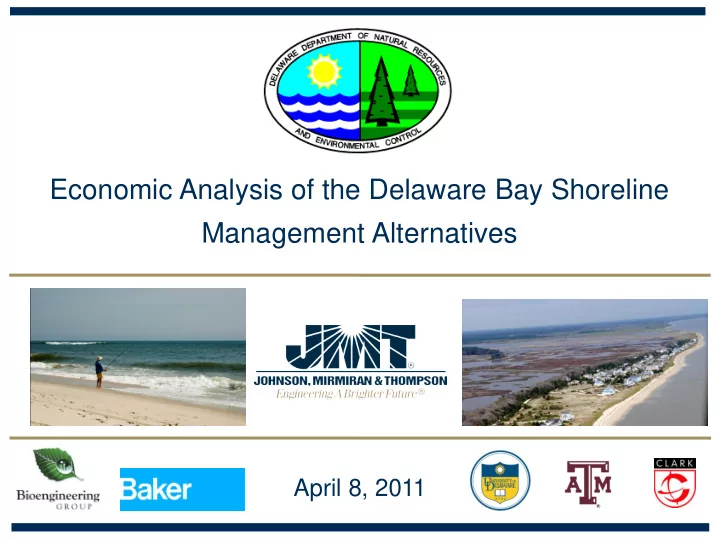

Economic Analysis of the Delaware Bay Shoreline Management Alternatives April 8, 2011
Approach OVERVIEW -AGENDA DNREC Actions Since Last Workgroup Meeting Coordination with the Delaware Bay Working Group – Communications Presenters JMT Presentation JMT Team Study Area Approach Schedule/Status Discussion
JMT Team Contract Management, Data Collection, Shoreline Protection Design, FEMA BCA Jim Eisenhardt, CFM, PWS – Contract Manager Coastal Modeling, FEMA/USACE BCA, Data Support - Surveying Doug Plasencia, PE Economic Analyses (Natural/Water Resources, Tourism, Recreation, Coastal ManagementProperty – Economic Development) Joshua Duke, PhD Ari Michelsen, PhD Robert Johnston, PhD
Study Area/Communities
Study Area/Communities
Study Area/Communities
Communications Key Partners/Affected Parties… Private Unincorporated Homeowners Communities State of Delaware Bowers/ Local Coastal Slaughter Property Owners Communities Kent/Sussex Counties Kent/Sussex Counties Federal Government State of Delaware Federal Environmental Agencies Advocates Academic & Resource Scientific Users Community
Approach OVERVIEW Developing Strategy with DNREC – Integrated Partner Throughout Determine desired range of outcomes and economic assessments Collect Data in support of selected scenarios and economic assessments Complete coastal engineering modeling and alternative protection concept development and model scenarios Complete economic models Develop presentation materials for policy makers, agencies and public
Approach General Scope Outline Data Collection/Assessment – Strategy Development (PHASE 1) Economic Analyses following FEMA/USACE standard protocols (PHASE 1) Flood Damage Assessment Affected Property Inventories – Surveys (PHASE 1A) Coastal Hazard Modeling – Flood/Surge Elevations (PHASE 1B) Shoreline Adaptation Alternatives Development (PHASE 1C) Storm Damage Reduction Cost Estimates FEMA BCA models (PHASE 1D) Economic Analyses determining regional benefits from proposed actions (PHASE 2) Tourism/Recreation Property Valuation Ecosystem Benefits – Natural Resources Valuation Public Outreach/Education/Expert Testimony (PHASE 3 - throughout) General Public Stakeholder Coordination Delaware Bay Shore Task Force Affected Communities Documentation/Reporting (PHASE 4 – throughout)
Approach Planning Process Advisory Input Group Develop Problem Statement & RECOMMEND MENDATIO TIONS NS Forward Vision Data Collection and Analysis Planning Evaluation of Planning Quantification Objectives Management Objective and Alternatives Under Refinement Distribution of Multiple Planning Benefits? Scenarios Joint Outreach with Key Stakeholders… Delaware Bay Beaches Working Group…
Approach Concurrent Regional Efforts - Considerations Sea Level Rise/Inundation Mapping/Projections Living Shorelines Regional Sediment Management TNC/NFWF Priority Restorations Shoreline State/Federal Lands Management Others
Approach ECONOMIC ANALYSES - Categories of Economic Effects to be Analyzed Structures/Assets Damages Tourism Revenues Recreation Property values Local/Statewide business revenues Population demographics – shifts Natural Resource Capital Valuation Wetlands, Wildlife, Fisheries, Etc. Others
Approach ECONOMIC ANALYSES - INTEGRATED - FEMA BCA, Data Support - FEMA/USACE BCA, Tax/Real Property, Data Support - Environmental, Natural Resources, Tourism, Recreation, Property – Economic Development - Environmental, Water Resources/Water, Coastal Management - Environmental, Natural Resources, Tourism, Recreation, Coastal Management
Approach ECONOMIC ANALYSES - INTEGRATED FEMA / USACE BCA/Risk Assessment – traditional flood damage reductions Natural Resource Value Capital Tourism / Tax Base – Land Use Projections Community / Benefactor Identification
Approach/Status
Approach Schedule: 12 Months Refer to Flow Diagram NTP – March 1, 2011 Flood Damage Assessment Inventory complete – April 15 Management alternatives/projections selected – May Phase 1 Data collection complete – May Initiate FEMA BCA tasks – May 1 Complete FEMA BCA evaluations – August 1 Complete GIS/Database Reports/Images – September 1 Initiate development of economic models – May 1 Complete economic models – November 1 Vette results with DNREC – November Present results to Workgroup – December/January, 2012 (February considering holidays)
Questions
Recommend
More recommend